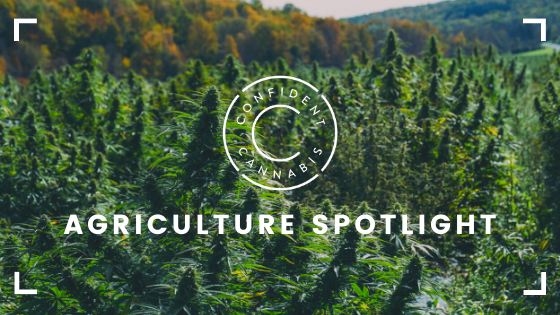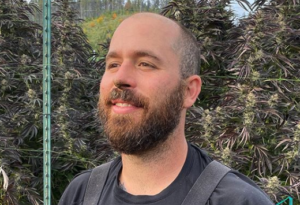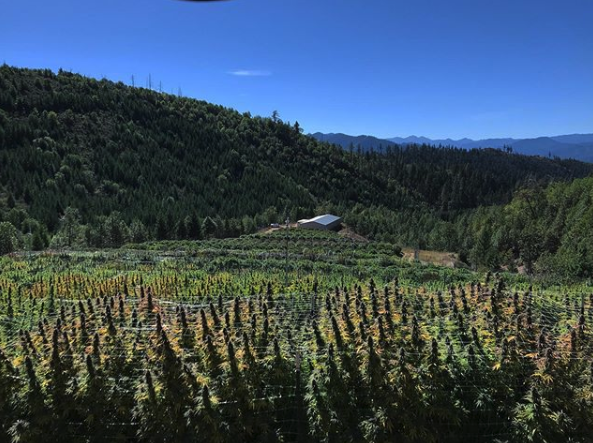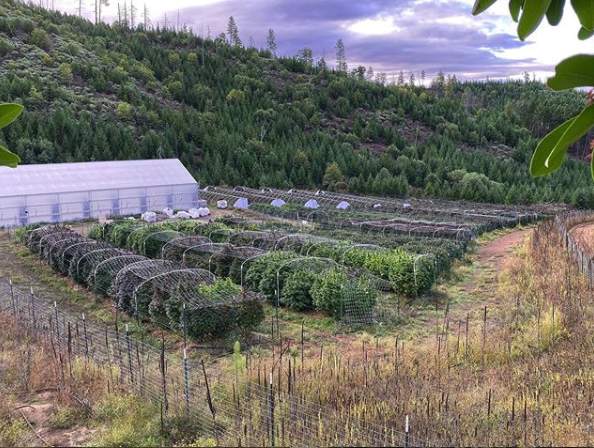Noah Levine is the owner of Benson Arbor, a locally-operated family cannabis farm on the Oregon side of the Siskiyou Mountains. He brings a unique perspective to the cannabis industry as one of the few growing since first obtaining a medical card in the early 2000s. He built experience through 15 years of medical cannabis cultivation with a dedication to providing exceptional quality at an affordable price—a journey that began in California before taking him to Oregon. You might know them under a different name, previously operating as Benson Elvis (a name that pays homage to the beloved family dog and his lip-curled smile), they are now in the middle of switching the company branding over to Benson Arbor to define the future of the company.
Born in California, Noah and his family have lived in Oregon for six years. After graduating from Santa Clara University, he began growing for a medical dispensary in the Bay Area earlier than most. The first and only farmer in the family, Noah’s passion for the cannabis plant drove him eagerly towards the business.
“I got a California Med Card in 2005 and started growing in apartments, then moved to commercial buildings,” he said. “I was running an indoor commercial operation in Oakland and Berkeley when I saw the opportunity to grow outdoors.”
Noah credits his decision to switch to outdoor growing as profit-driven. He saw other major outdoor operations growing hundreds and thousands of pounds per year, something difficult to accomplish on the indoor side. Now that he’s been farming outdoors since 2009.
It’s clear to him that the highest quality cannabis comes from growing outdoors using organic techniques in living soil. He reminisced that in the beginning, if you wanted to grow a legal cannabis business, anyone could do that in Oregon. He began growing medical cannabis in Oregon in 2014 and then moved into recreational growing in 2017 and 2018.
“It seemed exciting, like a new Wild West,” he said. “When legalization came, and there was a chance to have a licensed farm, we jumped at it.”
Benson Arbor is still Excited about New Strains Each Year
While the core team at Benson Arbor is about five people, about 20 people are working Noah’s land as the farm is gearing up to cut their clones within the next two months. Noah admittedly has a healthy obsession with cannabis genetics, and his team just began their own breeding program that will break in the market next year.
“The genetic potential of a plant is your limiting factor to good cannabis,” he said. “No matter how good you are at growing, you can only do as well as the genetics will allow.”
The reason he works so diligently on finding the right plants that will produce beautiful products, Noah pointed out, is because working-class people deserve excellent quality cannabis that they can afford.
“Oregon is very value-driven,” Noah said. “Our goal as a brand is to create a high-quality product at an affordable price.”
Living Soil Makes a Thriving Farm
As opposed to a lot of cannabis grown indoors where the soil is replaced with each new grow, Noah treats his soil beds like a living organism to create an environment where everything works together.
“Each year, our soil gets better because we’re not resetting our microbe population,” he said. “We’re growing, expanding, and thriving together, which means all of the microorganisms are working together to feed the plant.”
The motto he swears by: Feed your soil, and your soil will feed your plant. Their other farming philosophy is very minimal organic intervention, perhaps using only a little composted chicken manure and fish meal to feed their soil or glacial rock dust for mineral adjustments. These practices create beautifully clean plants but can create complications when it comes to fighting pests.
“There are a whole host of pests that will come in, and we have to find natural ways of dealing with them,” he said.
Predator mites are one of those biocontrol alternatives to toxic pesticides.
“These predator bugs come right out the gate searching for spider mites,” Noah said. “A lot of predator mites are raised on alternative food sources, but this company raises them on spider mites that attack our plants. They make them genetically driven to attack spider mites.”
Overcoming Challenges along the Journey
In the beginning, Noah recounted that they were still a medical farm with the most significant obstacle being the switch over to an organic cultivation practice from what they had been doing with the indoor grow in California, which came with a pretty steep learning curve. Then in 2017 and 2018, the challenge became surviving the market crash that saw prices drop by 80% with many companies going under because they couldn’t make the margins work.
“I think we made a couple of good moves that helped us survive the crash a few years ago,” he said. “We partnered with really talented oil processors known throughout the state that share our very high standard for quality. We don’t put things on the shelf that we don’t think are excellent and a good value for people, so consumers know if they are buying something with our brand on the label that they are getting a good quality product.”
Now the biggest challenge ahead is growing the company to meet demand. Noah said they typically sell out of flower and oils by May each year and then have no product for about five months until the next harvest. Opening new farmland is his key to that problem, but how do you grow a company when you can’t take out loans for proper expansion?
“As a cannabis company, we have zero access to traditional bank loans,” he said. “Luckily, some of those regulations are loosening to the point where we’ll probably be able to get a bank loan for a property in the near future. We’ve also been fortunate enough to be profitable along the way so we can roll some of those funds into expansion as well.”
“Our goal right now is to get bigger here in Oregon,” Noah said. “I think federal legalization won’t happen for another 5 to 10 years, so we plan to expand and increase our revenue here in the state.”
Working Together to Build Top Quality Oregon Cannabis
When asked about his partnerships within the industry, Noah pointed to his excellent relationships with oil processors but hasn’t had any partnerships with other farms because the market has been so incredibly competitive.
“I think most growers don’t do a whole lot of collaboration,” he said. “There are some farms in the area that we have shared knowledge with because they also have our sense of growing practices and passion for bringing something different to the market. There aren’t nearly enough amazing organic farms growing strains here. There is room for more companies like that to help us build a unique market in Oregon of growing top-quality cannabis.”
His dedication to creating high-quality cannabis is evident in the multiple awards they received at both The Dope Cup and Oregon Growers Cup, taking home numerous awards for their flower and concentrates, including top honors for best sun-grown hybrid and indica flower and runner up for best BHO Butter.
Growing Beyond Benson Arbor’s Idyllic Mountain Setting
When you see the Benson Arbor name on a product in the dispensary, Noah hopes you’ll think of his family growing that flower up in the mountains with the best possible intentions of making something special.
“I live on the farm with my wife and son, and this is very much a family-oriented business,” he said. “We grow in our native soil on the property that has existed here for hundreds of years.”
As they expand and grow, Noah admitted that they will eventually leave their 200-acre farm surrounded by thousands of acres of untouched forest because there just isn’t enough irrigated acreage to expand. However, they will always keep this land to create boutique, small-batch mountain-grown cannabis.
“What I love is the fresh, clean air up here,” he said. “We’re at 3000 feet; we’re not impacted by car exhaust or city pollution. It’s pristine and stunningly beautiful here.”
Visit Benson Arbor on Instagram.
You may have missed:
Agriculture Spotlight: Tom Scoble of Mother Magnolia Medicinals




